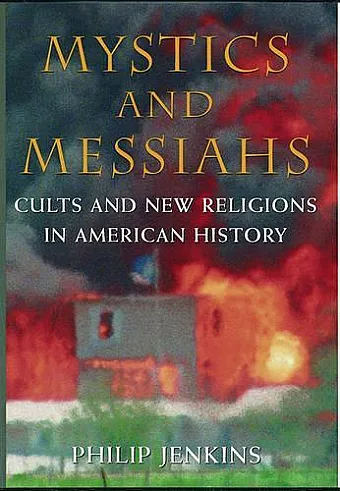Mystics and Messiahs
Cults and New Religions in American History
Format:Hardback
Publisher:Oxford University Press Inc
Currently unavailable, and unfortunately no date known when it will be back

Are religious fringe movements a recent phenomeon in American history? Are widespread fears of mass suicides, sexual abuse, and brainwashing in cults justified? Do marginalized religious groups play any positive role in American spiritual life? Do the panics over such groups follow any discernible pattern? Phillip Jenkins gives fascinating--and surprising--answers to these and many other questions in Mystics and Messiahs, the first full account of cults and anti-cult scares in American history. Jenkins shows that, contrary to popular belief, cults were by no means an invention of the 1960s. In fact, most of the frightening images and stereotypes surrounding fringe religious movements are traceable to the mid-nineteenth century when Mormons, Freemasons, and even Catholics were vehemently denounced for supposed ritualistic violence, fraud, and sexual depravity. As Charles Ferguson observed in 1928, "America has always been the sanctuary of amazing cults." But America has also been the home of an often hysterical anti-cult backlash. Jenkins provides an insightful new analysis of why cults arouse such fear and hatred both in the secular world and in mainstream churches, many of which--Baptists, Quakers, Pentecostals, and Methodists--were themselves originally regarded as cults. Most importantly, Jenkins argues that an accurate historical perspective is urgently needed if we are to avoid the kind of catastrophic confrontation that occurred in Waco or the ruinous prosecution of imagined Satanic cults in the 1980s. While not ignoring genuine instances of aberrant behaviour, Mystics and Messiahs goes beyond the vast edifice of myth, distortion, and hype to reveal the true characteristics of religious fringe movements and why they inspire such fierce antagonism.
Where the multiplication of sects was characteristic of just one phase of English history, the mid seventeenth century, such multiplication has been a constant feature of American history. This book is an engaging examination of that divesity. * Ecclesiastical History, vol. 52/4 *
Jenkins is to be commended for his thoroughness and his evenhandedness in describing and comparing heterodox religious movements. * Todd Breyfogle, Reviews in Religion and Theology, Vol 8, Issue 3, June 2001 *
With unusual insight and religious sensitivity, Jenkins explores the origins, development, and lines of continuity over time to various non-mainstream religious beliefs and practices in America ... Jenkins' account is learned and engaging to read; a helpful index makes it easy to find a discussion of whatever sect or movement - however conventional or quirky - the reader happens to fancy. The scope of the narrative is remarkable ... He effortlessly weaves together comparable stories from America's checkered religious past. * Todd Breyfogle, Reviews in Religion and Theology, Vol 8, Issue 3, June 2001 *
a book that is not only highly readable but also sheds important light on the development of alternative religions in the Western world. * Church of England Newspaper, 8th Sept, 2000. *
Perhaps this book will do some good by encouraging us to be more selective and discriminating in our response to them [cults]. * Church of England Newspaper, 8th Sept. 2000. *
Always stimulating * Patrick Allitt, TLS *
ISBN: 9780195127447
Dimensions: 237mm x 161mm x 24mm
Weight: 617g
304 pages